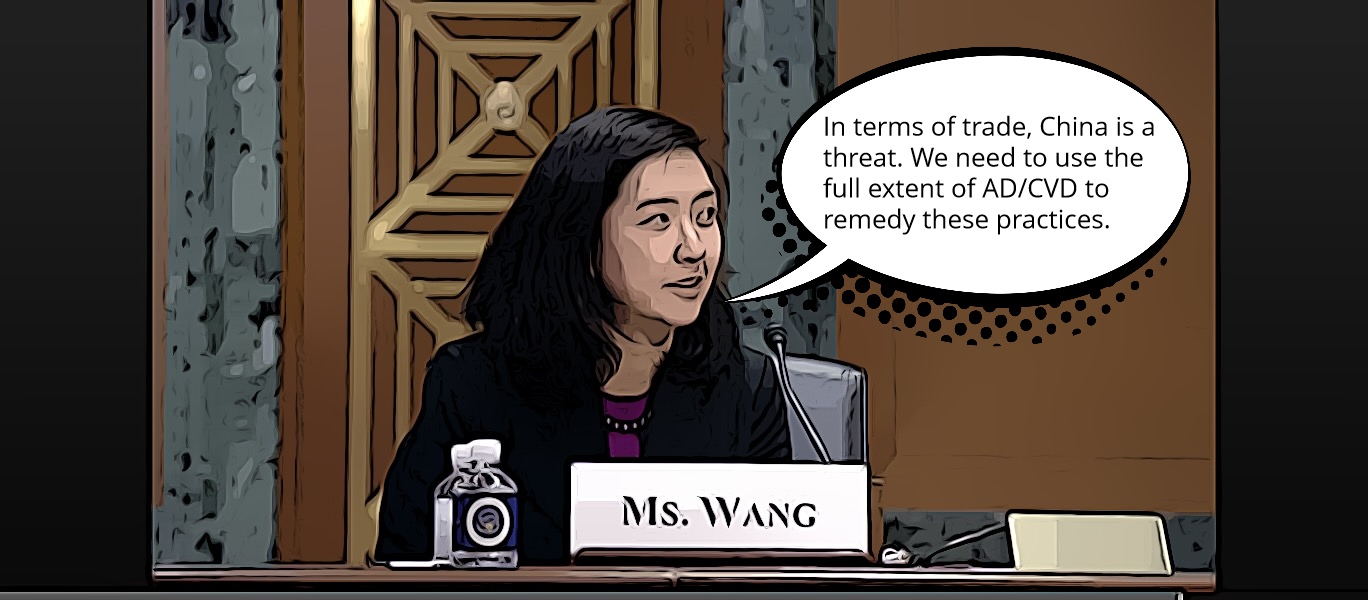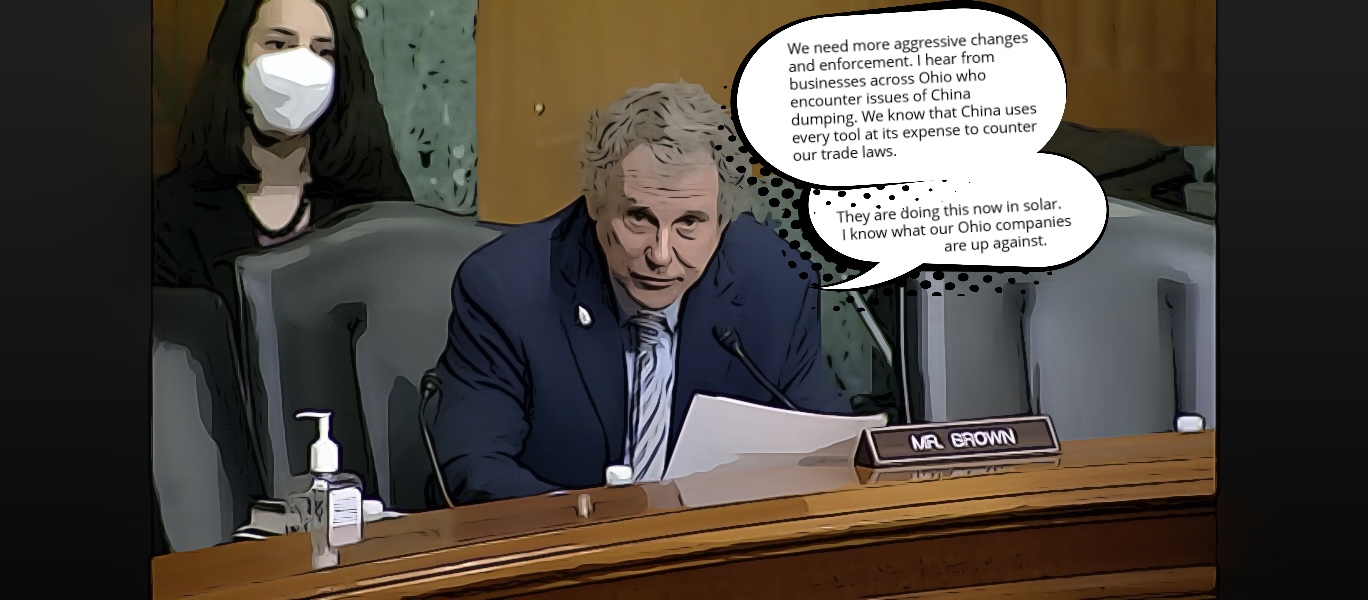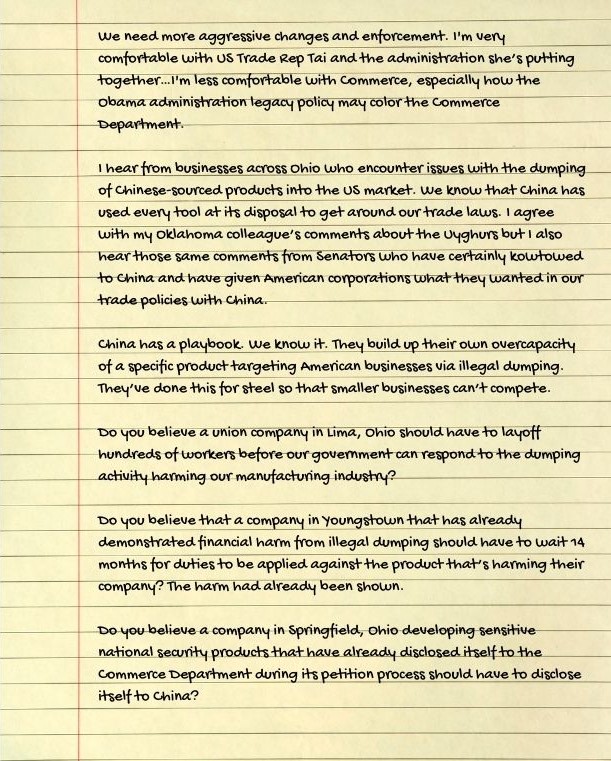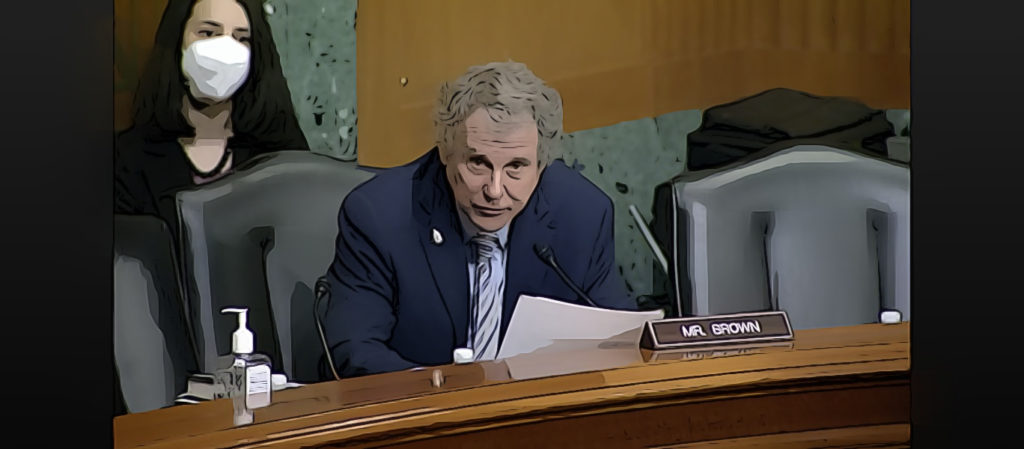In light of the November 11 decision by Commerce not to pursue an anti-dumping case against China solar companies in southeast Asia, Tuesday’s nomination hearing for two trade enforcement nominees shows the Senate Finance Committee is at odds with the Biden administration.
Even free trader Sen. Mike Crapo (R-ID), the ranking member of the Senate Finance Committee said, “Our industries have to be able to compete on an even playing field, including using dumping laws to remedy this…especially against China.”
The Senate Finance Committee interviewed two Biden nominees on Tuesday — Maria Louise Lago for the position of Under Secretary of Commerce for International Trade and Lisa Wang for the position of Assistant Secretary of Commerce. She would work on anti-dumping (AD/CVD) cases, mostly all of them against Chinese multinationals.
Wang began her opening remarks by saying her father immigrated to the U.S. because he believed it was a country where “fairness matters” and described him as an advocate for the American dream. She said her mom worked a lifetime of minimum wage jobs to help her rise to the level she is at today. “I believe U.S. businesses should not be undercut by unfair trade practices, subsidies, and dumping. I’ve seen manufacturing go from the brink of closure to capacity expansion due to fair trade promotion,” she said.
 As someone in charge of anti-dumping rules, Wang received the brunt of the frustrated questions from the Senate Finance members.
As someone in charge of anti-dumping rules, Wang received the brunt of the frustrated questions from the Senate Finance members.
When asked by Sen. Bill Cassidy (R-LA) about the enforcement of, and use of anti-dumping/countervailing duties tools at Commerce’s disposal, Wang said she would work for the “rigorous enforcement of AD/CVD.”
Knowing that Commerce just punted on a solar dumping charge against Vietnam, Malaysia, and Thailand – all three have miraculously become major solar exporters to the U.S. since tariffs were imposed on China – Cassidy responded: “I hear your pledge, but my constituents would like to see some action on that pledge.”
No one on the Committee asked if this case would be brought up again, or if Commerce could re-open it without an actual petitioner.
It’s not just Commerce. Homeland recently took a 180-degree turn regarding its ban on Hoshine Silicon Industry from the U.S. solar supply chain, giving them a pass if their polysilicon is not sourced from Xinjiang. The climate change-related provisions in the recently signed infrastructure law gutted any mention of removing forced labor-sourced goods from American supply chains.
James Lankford (R-OK) brought that issue up during the Q&A session. “John Kerry said human rights violations are his lane. So whose lane is it? I’d like to know so we can stop solar equipment from coming into this county that was made by forced labor.”
Lago said different government agencies have to work together on this, rather than at cross-purposes. “I abhor the forced labor abuses that the Chinese government is inflicting on the Uyghurs…I welcome being a part of the solution to forced labor in China,” she said in her interview.
Sen. Sharrod Brown (D-OH) was not pleased when any of this. Solar companies are in his state and will be impacted by tariff removals, and a weak Commerce Department.
“The Obama administration was essentially wrong on trade,” he said, adding that the Obama view permeates Commerce.
 Brown peppered her with questions related to companies in various cities in Ohio.
Brown peppered her with questions related to companies in various cities in Ohio.
“Do you believe a company should have to lay off hundreds of workers before the U.S. does something on dumping?” he asked her.
She had no answer. She thanked him for the question and reminded him what her job would be inside Commerce.
Brown: “That’s not an answer to my question.” He asked it again.
Wang: “No, I don’t believe there should be layoffs of American workers due to unfair trade practices by China.”
Sen. Bob Menendez (D-NJ) was also left without an answer to one of his questions to Wang on enforcement. He was emphatic. “I will not be able to be supportive if I cannot get clear answers and I hope Commerce gets the message.”
One of the more surprising exchanges was sparked by Sen. Sheldon Whitehouse (D-RI) when he brought up climate change and environmental policies. He asked Lago about a carbon adjustment tax on China but she said she did not know the subject well enough to comment. Then he turned to “pirate fishing”. China is involved in predatory fishing practices in much of the Pacific.
“It is outraging to many countries and it does intense damage to our oceans, a common resource to the world,” Whitehouse said. “It’s unfair to American fishermen and yet that gets no attention.”
Wang: “Pirate fishing also includes forced labor. We are working with the USTR on this issue.”
Whitehouse: “We need to get out ahead of this. Coastal communities are fed up.”
Then, Chairman Ron Wyden (D-OR) chimed in.
Wyden: “I just want to say that Whitehouse is being far too diplomatic. The stall ball that has been played for years and years as China pillages our fisheries is unconscionable, inexcusable and I will be watching (Commerce) very closely for the activities that are coming up in terms of negotiations (with China). If progress is not made we are going to pursue legislation to make sure we up the ante and stop this absurd practice and stop standing around and allow it to happen.”
The takeaway on Tuesday was a sense of immense frustration from most Senators involved. While a majority of them on the panel share the view that China’s mercantilism is helping to bleed out the U.S. middle class and the industrial base, there was a stark sense today that the Executive Branch is playing it too soft.
“I vote for almost every Biden nominee,” said Brown, the last Senator on the Committee to ask questions. “I am somewhat skeptical on trade issues because I’ve seen over the course of Democratic and Republican presidents a bias towards U.S. corporate interests that shut down production in this country and move overseas to sell their products back into this country.” He closed with a warning to the nominees and their respective departments. “The president of the Federal Reserve in Richmond once told me ‘watch what I do, and let me know you’re watching’,” Brown said in closing.

A verbatim sampling of some of the questions and comments Senator Brown fired off to Lisa Wang during her nomination hearing on November 16, 2021.













